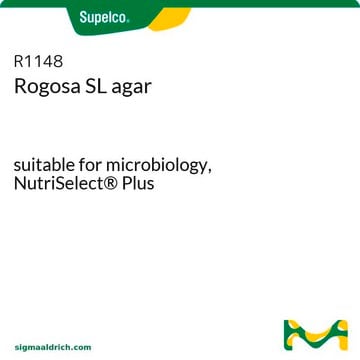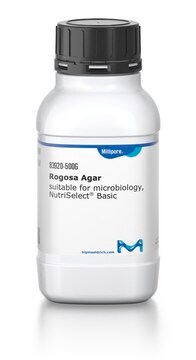1.10660
GranuCult® prime MRS agar (de MAN, ROGOSA and SHARPE)
according to ISO 15214, for Lactobacillus spp., suitable for microbiology
Synonyme(s) :
Lactobacillus Agar, Lactobacillus Agar according to DeMan, Rogosa and Sharpe, Lactobacillus selective medium, DeMan, Rogosa, Sharpe agar
About This Item
Produits recommandés
Agence
APHA
according to ISO 15214
Niveau de qualité
Stérilité
non-sterile
Forme
granular
Conditionnement
pkg of 500 g
Fabricant/nom de marque
GranuCult® prime
Conditions de stockage
dry media (Keep tightly closed)
Technique(s)
microbiological culture: suitable
Couleur
beige
pH
5.5-5.9 (25 °C, 66.24 g/L in H2O, after autoclaving)
Solubilité
68.2 g/L
Masse volumique apparente
600 kg/m3
Application(s)
food and beverages
microbiology
Température de stockage
2-8°C
Adéquation
Lactobacillus spp.
Description générale
Application
Caractéristiques et avantages
- GranuCult® offers superior granulated culture media.
- Safe and sustainable due to reduced risks associated with fine dust and toxic substance inhalation, resulting in a safer work environment.
- Excellent wettability, solubility, and free-flowing properties
- Convenient, with minimal component separation and clumping, even under warm or humid conditions.
- High batch-to-batch reproducibility
- Prolonged shelf life of up to five years
- High number of test strains exceeding all regulatory demands
- Granulation technology allows many supplements to be included, with no need to add these separately
Remarque sur l'analyse
Appearance (colour): brown
pH-value (25 °C): 5.6 - 5.8
Solidification behaviour (2 hrs., 45 °C): liquid
Growth promotion test in accordance with the current version of DIN EN ISO 11133.
Inoculum on reference medium (Lactobacillus acidophilus ATCC 4356 (WDCM 00098)):
Inoculum on reference medium (Lactobacillus sakei ATCC 15521 (WDCM 00015)):
Inoculum on reference medium (Lactococcus lactis spp. lactis ATCC 19435 (WDCM 00016)):
Inoculum on reference medium (Pediococcus pentosaceus ATCC 33316 (WDCM 00158)):
Inoculum on reference medium (Pediococcus damnosus ATCC 29358 (WDCM 00022)):
Colony count (Lactobacillus acidophilus ATCC 4356 (WDCM 00098)):
Colony count (Lactobacillus sakei ATCC 15521 (WDCM 00015)):
Colony count (Lactococcus lactis spp. lactis ATCC 19435 (WDCM 00016)):
Colony count (Pediococcus pentosaceus ATCC 33316 (WDCM 00158)):
Colony count (Pediococcus damnosus ATCC 29358 (WDCM 00022)):
Recovery on test medium (Lactobacillus sakei ATCC 15521 (WDCM 00015)): ≥ 70 %
Recovery on test medium (Lactobacillus acidophilus ATCC 4356 (WDCM 00098)): ≥ 70 %
Recovery on test medium (Lactococcus lactis spp. lactis ATCC 19435 (WDCM 00016)): ≥ 70 %
Recovery on test medium (Pediococcus pentosaceus ATCC 33316 (WDCM 00158)): ≥ 70 %
Recovery on test medium (Pediococcus damnosus ATCC 29358 (WDCM 00022)): ≥ 70 %
Growth (Escherichia coli ATCC 25922 (WDCM 00013)): total inhibition
Growth (Escherichia coli ATCC 8739 (WDCM 00012)): total inhibition
Growth (Bacillus cereus ATCC 11778 (WDCM 00001)): total inhibition
Growth (Bifidobacterium bifidum ATCC 11863): good growth
Incubation: 72 ± 3 hours at 30 ± 1 °C aerobic; Bifidobacterium anaerobic
A recovery rate of 70 % is equivalent to a productivity value of 0.7.
The indicated colony counts result from the sum of a triple determination.
Reference media: MRS-Agar
Autres remarques
- Do not use clumped or discolored medium.
- The prepared medium is clear and brown.
- Prepared plates can be stored at +2 °C to + 8 °C °C in the dark and protected against evaporation for up to 14 days.
Note de bas de page
The designations basic, plus, or prime are added to indicate the quality control level, from basic quality control to standard QC plus to prime for full regulatory compliance.
Informations légales
Produit(s) apparenté(s)
Code de la classe de stockage
11 - Combustible Solids
Classe de danger pour l'eau (WGK)
WGK 3
Certificats d'analyse (COA)
Recherchez un Certificats d'analyse (COA) en saisissant le numéro de lot du produit. Les numéros de lot figurent sur l'étiquette du produit après les mots "Lot" ou "Batch".
Déjà en possession de ce produit ?
Retrouvez la documentation relative aux produits que vous avez récemment achetés dans la Bibliothèque de documents.
Les clients ont également consulté
Notre équipe de scientifiques dispose d'une expérience dans tous les secteurs de la recherche, notamment en sciences de la vie, science des matériaux, synthèse chimique, chromatographie, analyse et dans de nombreux autres domaines..
Contacter notre Service technique













